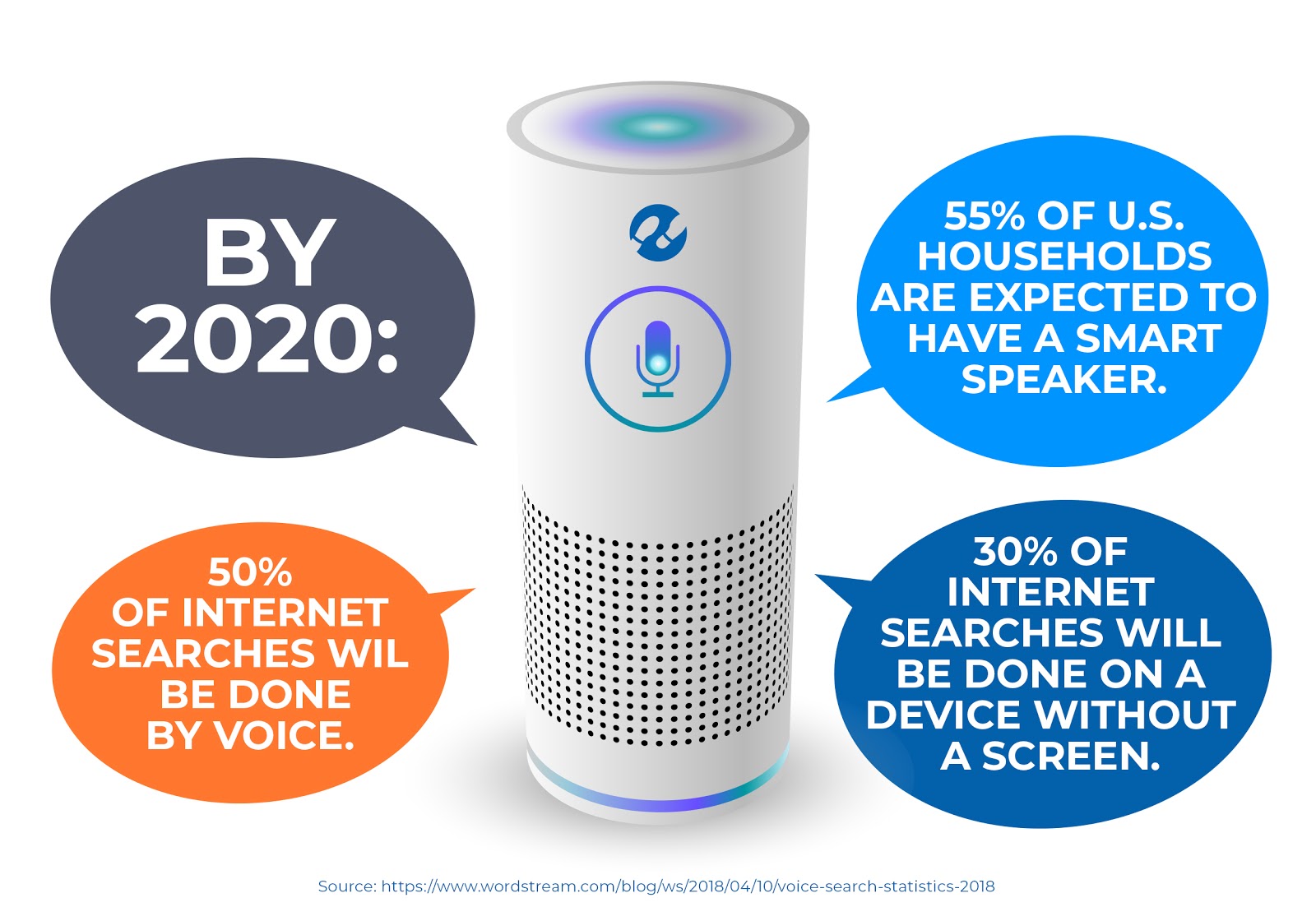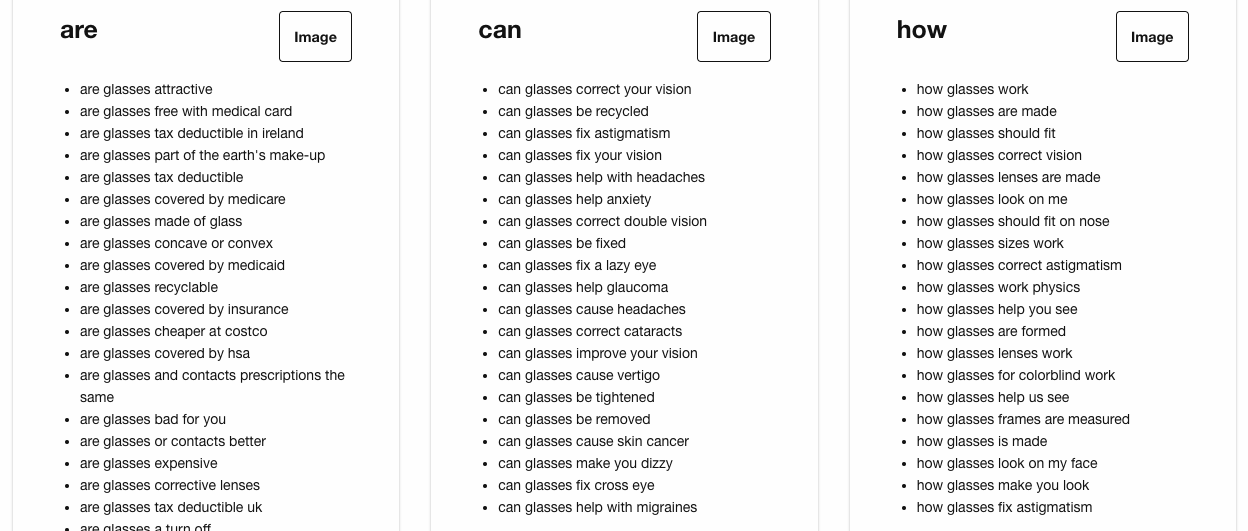Voice commands are the newest evolution – or revolution – in technology. From the radio in your car to the refrigerator in your kitchen, voice-activated response is becoming more integrated and more important to our tech.
So, how important is it to optimize your website for voice right now? (Hint: It’s a lot more important than you probably think!)
Why Is Voice Search so Important to Marketing Strategy Already?
In 2017, 13% of U.S. households already had some type of smart speaker, whether it was Alexa, Cortana, Siri or Google Assistant. That number is predicted to rise to 55% by just 2020. Experts also expect that fully half of all searches in 2020 will also be done by voice – and 30% of them without a screen in sight!

The popularity of voice search is amazing when you consider that 60% of people who have tried voice search on their smartphones have only started using it in the last year. So many people find voice search easier than typing a command, that 40% of adults are already using voice search at least once a day.
Further Reading:
What Challenges Does Voice Search Present for Marketers?
Voice search presents some new marketing challenges and it’s definitely not too early to make changes. If you wait much longer, it may be too late. As voice-recognition technology improves, its popularity is going to rise exponentially.
You’ll also likely see some important changes to voice search that are going to affect the way websites will need to optimize, including:
- More complex queries. Early voice-search technology required users to carefully choose each word of their query – simple commands and keywords worked best. Today, new technology is making complex questions possible which means that it is more responsive to natural speech.
- Less visual cues. Marketers are used to putting a lot of thought into how information is displayed on a screen for maximum visual impact and retention. As users move away from their screens and toward voice-only search, marketers are going to have to rethink the importance of visual information and come up with new strategies when they need to emphasize something.
- Fiercer competition. Voice search is ideal for short interactions, like finding the best restaurant in town or looking for the nearest coffee shop. Since voice results typically only pull from the top response for any given query, landing in that top spot will be more important than ever.
- Local search results. Voice searches are heavily slanted toward “in-the-moment” queries from people on the go or those trying to fulfill an immediate need – which is where local search excels.
- Flexibility is key. Every device that uses voice search is a little bit different from the next one. For example, Google devices often pull voice search responses from Google’s Answer Box, or “position zero.” Siri is more likely to give you a location-based response. You have to be conscious of your optimization strategy and plan accordingly.
If you’ve been steadily improving your website’s optimization and tweaking it for local search, you’re already on the right path. Now you just need to start digging a little deeper with voice search in mind.
How Do You Optimize For Voice Search?
Your number one goal is always to make it easy for your customers (or potential customers) to find your website or business and purchase your goods or services. It makes sense to stay ahead of the curve as the technology of search – and the culture of the searchers – changes.
Before you can start optimizing for voice search, you need to understand the major ways it differs from traditional search:
- Length. Voice search uses a lot more words than traditional search. People speak faster than they can type, and it makes a difference.
- Questions. There are more actual questions. Instead of typing in “best Italian restaurant near me” in a search box, people will ask a smart speaker “Where is the best Italian restaurant in the city?” A tremendous number of voice queries start with “who,” “what,” “where,” “when,” “why,” and “how.”
- Simple. Voice search relies on brevity and clarity in its responses to be effective. The average response to a voice query is 29 words long and written at a ninth-grade level.
- One. Voice searchers don’t get a whole page of responses to their questions. They get one answer. And they expect that answer to be a good one.

You can extrapolate a list of “best practices” for voice search optimization out of this information alone. Here’s how to start.
Further Reading:
1) Don’t Forget Standard SEO
Optimizing for voice search begins with standard search engine optimization (SEO) best practices:
- Build quality content with authoritative answers around your brand, products and services.
- Do your keyword research and make certain that you have good meta descriptions for all your content.
- Ensure that your website is optimized for speed and easy to read.
- Update your profiles on your site and social media, and make sure that your name, email, address, phone number (NAP) and hours of business are all complete.
No matter what else you do, the higher you can get your page to rank on a SERP for a specific keyword, the better your chances of being chosen for a voice search result. Click To Tweet
2) Create Content with Definitive Questions and Answers
Because voice search results give searchers just one answer, that answer needs to be useful and correct. It also needs to be easy to understand and brief. Create content that’s easily broken down into small pieces.
For example, voice search responses pull heavily from “Frequently Asked Questions” pages, which makes sense when you realize that the questions people ask in voice search tend to exactly match a question posed on an FAQ page.
This doesn’t mean that your pages all need to be brief, however. In fact, the opposite is probably true. You want to provide snippets of information that are easy for the smart speaker to articulate and deliver quickly, but you also want to pack your site with information. The more information you put out there, the greater your chances of providing a match to a question in voice search.
In fact, you need to constantly be on the prowl for questions that are relevant to your brand, products or services. Mine social media platforms and explore emails from customers for new questions you can answer and new ways to show your authority.
If you’re short on inspiration, check out sites like Answer The Public for ideas. Here’s an example of what comes up for “glasses”:

By the way, you can also view the results in an easier format:

Further Reading:
3) Focus on Long-Tail Keywords
Long-tail keywords are essential to voice search. Specifically, think about how people speak when they ask questions as you’re forming your choices for voice search keywords. Remember that people don’t speak the same way that they write. Conversational tones are key.
When crafting your long-tail keyword strategy, aim for a general headword with a few specific keywords added to help refine and narrow your focus. For example, if you own a pizza shop, “pizza” might be your headword, and your long-tail keywords could include things like “best pizza in Kent Ohio,” “authentic New York style pizza,” “pizza delivery to KSU,” and “mom and pop pizza shop in Kent.”
A tight, specific set of long-tail keywords not only helps you avoid competition, it helps with conversion rates. You know that your site will provide exactly what searchers are trying to find, and relevant content drives conversions.
4) Increase Your Site’s Overall Authority
This is typically part of a good SEO strategy, but it bears repeating. You need to constantly build your backlinks and your presence on social media in order to increase your site’s authority.
Social shares vastly increase the likelihood that your content will do well in voice queries. The average result of a voice search has been tweeted 44 times and shared on Facebook another 1,199 times!
However, social success isn’t the only important factor when it comes to authority. Voice results also tend to heavily favor content that ranks high in the regular SERPs and is sourced from pages with about 2,300 words. Voice results have exactly one chance to get the answer right for each question, so the algorithms naturally prefer content that is well-written, complete and seemingly trustworthy.
Quality content is always going to be key to topping the search results, whether the search is done on a laptop, phone, or by voice. Strive to become a singular authority in your niche – and the place that people naturally turn when they want information that’s relevant to your brand or products.
Get Ready – The Future of Search Is Here
Optimizing for voice search is partially about traditional SEO practices and partially about being conscious of the ways that voice search differs from typing a question into Google.
The most important thing to recognize is that the world of search is already rapidly changing (again). It’s time to invest in new strategies that will help you stay in touch with your customers through voice search – before you fall behind your competitors.
Further Reading: